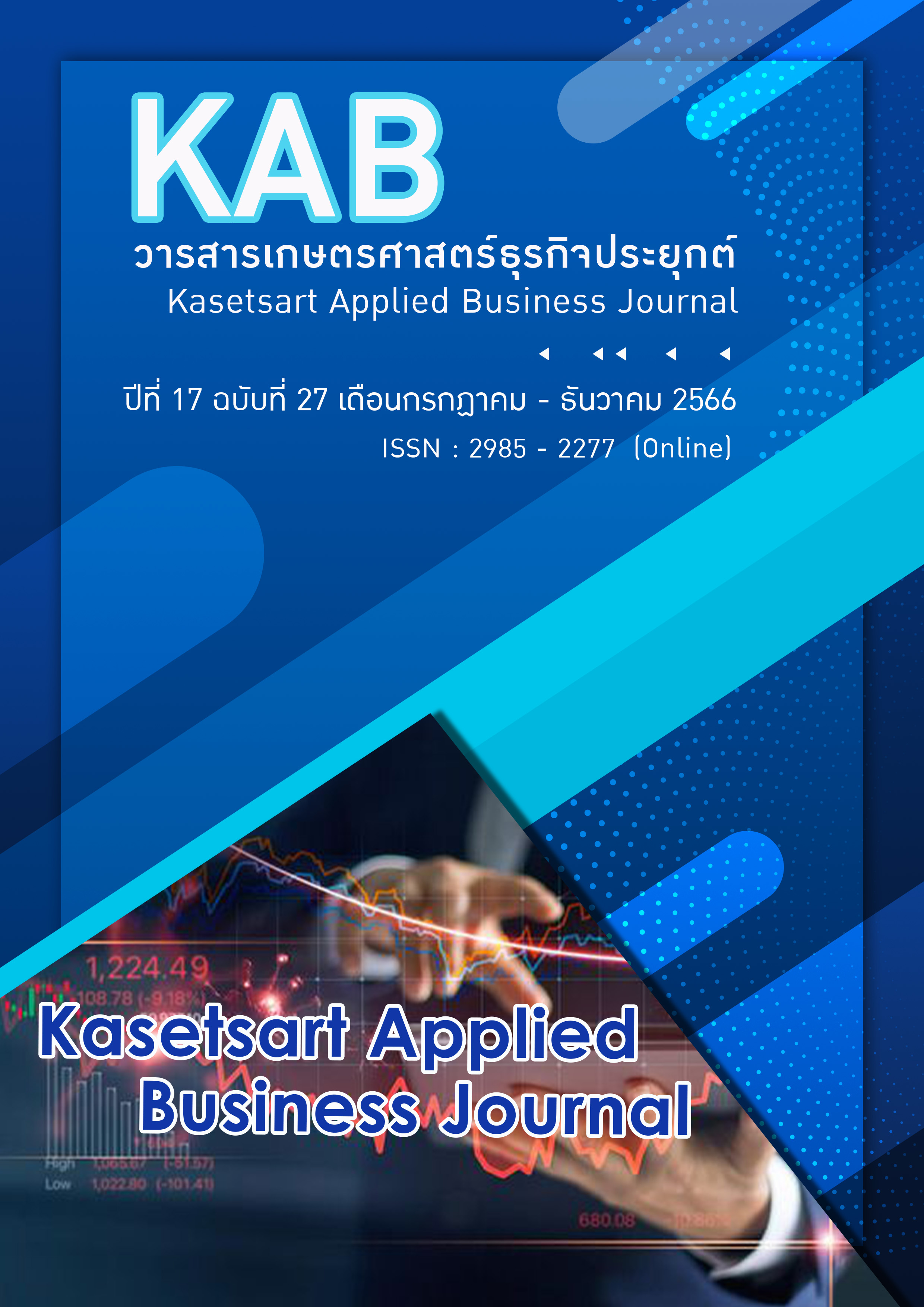การยอมรับเทคโนโลยีและความสำเร็จของระบบสารสนเทศที่ส่งผลต่อความตั้งใจใช้โดยมีความพึงพอใจของผู้ใช้งานเป็นตัวแปรส่งผ่าน กรณีศึกษาแอปพลิเคชัน Krungthai NEXT
Main Article Content
บทคัดย่อ
การวิจัยครั้งนี้มีวัตถุประสงค์เพื่อศึกษา 1) เพื่อศึกษาการยอมรับเทคโนโลยีของแอปพลิเคชัน Krungthai NEXT 2) เพื่อศึกษาความสำเร็จของระบบสารสนเทศของแอปพลิเคชัน Krungthai NEXT 3) เพื่อศึกษาความพึงพอใจของผู้ใช้งานต่อแอปพลิเคชัน Krungthai NEXT 4) เพื่อศึกษาความตั้งใจใช้งานของแอปพลิเคชัน Krungthai NEXT 5) เพื่อศึกษาอิทธิพลของการยอมรับเทคโนโลยีที่มีต่อความตั้งใจใช้แอปพลิเคชัน Krungthai NEXT โดยมีความพึงพอใจของผู้ใช้งานเป็นตัวแปรส่งผ่าน 6) เพื่อศึกษาอิทธิพลของความสำเร็จของระบบสารสนเทศมีต่อความตั้งใจใช้แอปพลิเคชัน Krungthai NEXT โดยมีความพึงพอใจของผู้ใช้งานเป็นตัวแปรส่งผ่าน ใช้แบบสอบถามเป็นเครื่องมือในการเก็บรวบรวมข้อมูลจากผู้ที่ใช้บริการโมบายแบงก์กิ้งผ่านแอปพลิเคชัน Krungthai NEXT ของธนาคารกรุงไทย จำนวน 450 คน ทำการวิเคราะห์โดยใช้สถิติเชิงพรรณนา ได้แก่ ค่าความถี่ ค่าร้อยละ ค่าเฉลี่ย ค่าส่วนเบี่ยงเบนมาตรฐาน และใช้สถิติเชิงอนุมานในการทดสอบสมมติฐานของการวิจัยด้วยวิธีการสร้างโมเดลสมการโครงสร้าง ผลการศึกษา พบว่า 1) การยอมรับเทคโนโลยี ในด้าน การรับรู้ถึงประโยชน์ และการรับรู้ถึงความง่ายในการใช้งานส่งผลทางตรงต่อความพึงพอใจของผู้ใช้งาน 2) ความสำเร็จของระบบสารสนเทศ ในด้าน คุณภาพสารสนเทศ คุณภาพระบบ และคุณภาพการบริการส่งผลทางตรงต่อความพึงพอใจของผู้ใช้งาน 3) ความพึงพอใจของผู้ใช้งานส่งผลทางตรงต่อความตั้งใจใช้ 4) การยอมรับเทคโนโลยีในด้าน การรับรู้ถึงประโยชน์ และการรับรู้ถึงความง่ายในการใช้งานส่งผลทางอ้อมต่อความตั้งใจใช้โดยมีความพึงพอใจของผู้ใช้งานเป็นตัวแปรส่งผ่าน 5) ความสำเร็จของระบบสารสนเทศในด้าน คุณภาพสารสนเทศ คุณภาพระบบ และคุณภาพการบริการส่งผลทางอ้อมต่อความตั้งใจใช้โดยมีความพึงพอใจของผู้ใช้งานเป็นตัวแปร อย่างมีนัยสำคัญทางสถิติที่ระดับ 0.001
Article Details

อนุญาตภายใต้เงื่อนไข Creative Commons Attribution-NonCommercial-NoDerivatives 4.0 International License.
Journal of TCI is licensed under a Creative Commons Attribution-NonCommercial-NoDerivatives 4.0 International (CC BY-NC-ND 4.0) licence, unless otherwise stated. Please read our Policies page for more information...
เอกสารอ้างอิง
กฤษณะ สมรบวรสุข. (2563). การยอมรับและการตัดสินใจใช้บริการทางการเงินผ่านแอพพลิเคชั่นธนาคารบนมือถือระยะยาวในเขตกรุงเทพมหานคร [สารนิพนธ์ปริญญาการจัดการมหาบัณฑิต]. มหาวิทยาลัยมหิดล. https://archive.cm.mahidol.ac.th/handle/123456789/3850
กษิดิศ พันธารีย์. (2562). การเปิดรับสื่อ การใช้ประโยชน์และความพึงพอใจต่อแฟนเพจเฟซบุ๊ก “อยุธยา กินอะไรดี By Wongnai” ที่ส่งผลต่อความตั้งใจใช้บริการร้านอาหารในจังหวัดพระนครศรีอยุธยา [สารนิพนธ์นิเทศศาสตรมหาบัณฑิต]. มหาวิทยาลัยกรุงเทพ. http://dspace.bu.ac.th/handle/123456789/4641
กัลยา วานิชย์บัญชา และ ฐิตา วานิชย์บัญชา. (2559). การใช้ SPSS for Windows ในการวิเคราะห์ข้อมูล (พิมพ์ครั้งที่ 27). โรงพิมพ์สามลดา.
ชนิกา ลักขณาศิริวัตร. (2560). อิทธิพลของคุณค่าที่รับรู้ด้านราคา และคุณภาพระบบ ต่อการใช้งาน ความพึงพอใจ การกลับมา ซื้อซ้ำและการบอกต่อของลูกค้าที่จองที่พักผ่านผู้ให้บริการเว็บไซต์ในประเทศไทย [สารนิพนธ์บริหารธุรกิจมหาบัณฑิต]. มหาวิทยาลัยกรุงเทพ. http://dspace.bu.ac.th/jspui/handle/123456789/3405
ณรงค์เกียรติ์ อ่ำบุญ. (2563). ปัจจัยส่วนประสมทางการตลาดสำหรับธุรกิจบริการและปัจจัยด้านการยอมรับเทคโนโลยีที่มีอิทธิพลต่อการตัดสินใจเลือกใช้ ApplicationMyMo ของลูกค้าธนาคารออมสินในกรุงเทพมหานคร [สารนิพนธ์บริหารธุรกิจมหาบัณฑิต]. มหาวิทยาลัยกรุงเทพ. http://dspace.bu.ac.th/handle/123456789/4866
ธนาคารแห่งประเทศไทย. (2564, 30 พฤษภาคม). ข้อมูลธุรกรรมการชำระเงินผ่านบริการ Mobile Banking และ Internet Banking. https://app.bot.or.th/BTWS_STAT/statistics/BOTWEBSTAT.aspx?reportID=949&language=TH
ธีร์ภาวิชญ์ พึ่งเมือง. (2559). การยอมรับเทคโนโลยีทางการเงิน กรณีศึกษา เทคโนโลยีพร้อมเพย์ [วิทยานิพนธ์วิทยาศาสตรมหาบัณฑิต]. มหาวิทยาลัยธรรมศาสตร์. https://digital.library.tu.ac.th/tu_dc/frontend/Info/item/dc:90561
ธเนศ มหัทธนาลัย. (2564, 13 กันยายน). แนวโน้มธุรกิจ/อุตสาหกรรม ปี 2564-2566: ธุรกิจบริการดิจิทัลและซอฟต์แวร์. วิจัยกรุงศรี.https://www.krungsri.com/th/research/industry/industry-outlook/Services/digital-software/IO/io-digital-software-21
แบงก์ติดสปีด “โมบายแบงกิ้ง” รองรับผู้ใช้งานธุรกรรม พุ่งก้าวกระโดด. (2564, 5 พฤษภาคม). ประชาชาติธุรกิจ ออนไลน์. https://www.prachachat.net/finance/news-659420
ปิยศักดิ์ มานะสันต์. (2560, 18 มกราคม). จาก New Normal สู่โลกยุค 4.0. กรุงเทพธุรกิจ.https://www.bangkokbiznews.com/blog/detail/640062
ยุวรี ผลพันธิน. (2561). บทบาทการส่งผ่านของตัวแปร: หลักการและการนำไปใช้. วารสารอิเล็กทรอนิกส์ Veridian, 11(3), 3433-3441.
ศูนย์วิจัยกสิกรไทย. (2564, 18 พฤษจิกายน). โควิดระลอก 3 ดันยอดใช้งาน Mobile Banking และ E-Wallet โต. https://kasikornresearch.com/th/analysis/k-social-media/Pages/Mobile-Banking-FB-18-05-21.aspx
Ali, B. J., Gardi, B., Othman, B. J., Ahmed, S. A., Ismael, N. B., Hamza, P. A., Aziz, H. M., Sabir, B. Y., Sorguli, S., & Anwar, G. (2021). Hotel Service Quality: The Impact of Service Quality on Customer Satisfaction in Hospitality. International Journal of Engineering, Business and Management (IJEBM), 5(3), 14-28. https://doi.org/10.22161/ijebm.5.3.2
Alshammari, S. H., & Rosli, M. S. (2020). A Review of Technology Acceptance Models and Theories. Innovative Teaching and Learning Journal, 4(2), 12-22.
Byrne, B. M. (2010). Structural Equation Modeling with Amos: Basic Concepts, Applications, and Programming (2nd ed.). Taylor and Francis Group.
Cheng, S. (2011). Comparisons of Competing Models between Attitudinal Loyalty and Behavioral Loyalty. International Journal of Business and Social Science, 2(10), 149-166.
El-Ebiary, Y. A. B., Abu-Ulbeh, W., Ebrahim, H. M., Yusoff, M. H., Almandeel, S., & Pandey, B. (2020). Extending the Information Systems Success Model with Transformational Leadership and Compatibility. Test Engineering and Management, 83, 17110-17117.
Ghobakhloo, M., & Fathi, M. (2019). Modeling the Success of Application-Based Mobile Banking. Economies, 7(4), 114. https://doi.org/10.3390/economies7040114
Hair, J. F., Black, W. C., Babin, B. J., & Anderson, R. E. (2010). Multivariate Data Analysis (7th ed.). Pearson.
Khasawneh, M., & Alqurran, T. A. A. (2019). Factors Influencing Consumers' Intention to Adopt and Use Mobile Banking Applications in Jordanian Islamic Banks. European Journal of Scientific Research, 152(4), 384-393.
Khoi, B. H. (2020). Technology Acceptance Model in the Managing Information System. Journal of Advanced Research in Dynamical and Control Systems, 12, 869-876. https://doi.org/10.5373/JARDCS/V12SP7/ 20202177
Kline, R. B. (2010). Principles and Practice of Structural Equation Modeling (3rd ed.). Guilford Press.
Koloseni, D. N. (2021). User Perceptions of Mobile Banking Apps in Tanzania: Impact of Information Systems (IS) Factors and Customer Personality Traits. The African Journal of Information and Communication, 28, 1-26. https://doi.org/10.23962/10539/32214
Leon, M. V. (2019). Factors influencing behavioural intention to use mobile banking among retail banking clients. Jurnal Studi Komunikasi, 3(2), 118-137. https://doi.org/10.25139/jsk.v3i2.1469
Memon, M. A., Ting, H., Cheah, J., Thurasamy, R., Chuah, F., & Cham, T. H. (2020). Sample Size for Survey Research: Review and Recommendations. Journal of Applied Structural Equation Modeling, 4(2). https://doi.org/10.47263/JASEM.4(2)01
Metlo, M. Y., Hussain, N., Saqib, G., Phulpoto, K., & Abro, S. (2021). Impact of Mobile Banking on Customers' Satisfaction. International Journal of Management, 12(1), 1263-1271.
Nusairat, N. M., Abdellatif, H., Al-Gasawneh, J. A., Akhorshaideh, A. H. O., Aloqool, A., Rabah, S., & Ahmad, A. M. K. (2021). Determinants of behavioral intentions to use mobile healthcare applications in Jordan. International Journal of Data and Network Science, 5, (547-556). https://doi.org/10.5267/j.ijdns.2021.8.013
Omar, K., Razali, M. K. A. M., Samsudin, H., Halim, M. A. S. A., Manaf, N. A., Kamaruddin, S. N. A. A., & Saputra, J. (2021). The Moderating Role of Training on Personality and Behaviour Intention to Participate among Nature Tourist Guides [Paper presentation]. Proceedings of the 11th Annual International Conference on Industrial Engineering and Operations Management Singapore, Singapore, 3316-3324. https://doi.org/10.46254/AN11.20210005
Park, E. S., & Park, M. S. (2020). Factors of the Technology Acceptance Model for Construction IT. Applied Sciences, 10(22), 8299. https://doi.org/10.3390/app10228299
Yakubu, M. N., & Dasuki, S. I. (2018). Assessing eLearning Systems Success in Nigeria: An Application of the DeLone and McLean Information Systems Success Model. Journal of Information Technology Education, 17, 182-203. https://doi.org/10.28945/4077


